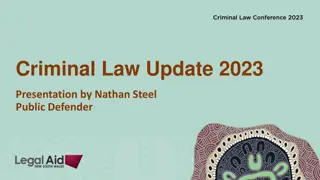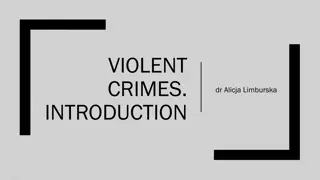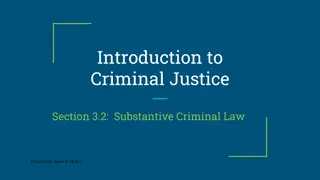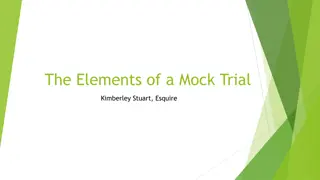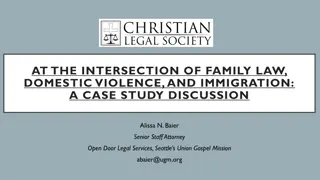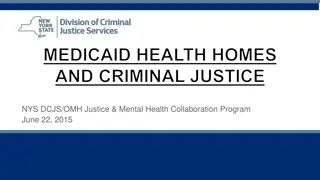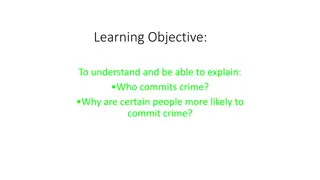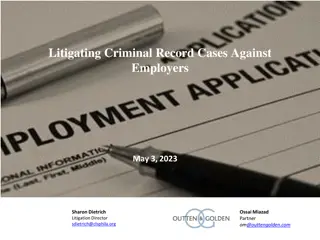Understanding Unacceptable Risk Cases at the Intersection of Family and Criminal Law
Exploring the complexities of unacceptable risk cases where family and criminal law meet, with a focus on the legislative pathway, standard of proof, parenting considerations, and the paramount importance of the child's best interests. The discussion delves into assessing risks, deciding on parenting arrangements, considering abuse and neglect, and safeguarding children from harm within legal proceedings.
Download Presentation

Please find below an Image/Link to download the presentation.
The content on the website is provided AS IS for your information and personal use only. It may not be sold, licensed, or shared on other websites without obtaining consent from the author. Download presentation by click this link. If you encounter any issues during the download, it is possible that the publisher has removed the file from their server.
E N D
Presentation Transcript
Unacceptable risk cases and the intersection of family and criminal law Peace Decle, Barrister Commercial Bank Chambers
Part 1 - Legislative pathway - Standard of proof - Unacceptable risk cases Family law parenting cases Part 2 - Contact and Communication - Deciding whether to defend charges/ADVO - Obtaining psychological/psychiatric reports in criminal proceedings - Local Court's power to make parenting orders - Involvement of children - Interim parenting decisions - Evidence gathering generally - Independent sources of evidence - Expert evidence - Sharing information from family law proceedings - Final parenting hearings - Legal Costs Forensic & evidentiary considerations
Part 1 Family law parenting cases
Paramount consideration = the best interests of the child Primary considerations: (a) The benefit to the child in having a meaningful relationship with both of the child s parents; and (b) The need to protect the child from physical or psychological harm from being subjected to, or exposed to, abuse, neglect or family violence. Secondary considerations include: any views expressed by the child the nature of the relationship between the child and each parent the past involvement of each parent with the child the likely effect of any changes the capacity of each parent to provide for the intellectual and emotional needs of the child any family violence involving the child or a member of the child s family
"Abuse" is: (a) an assault, including a sexual assault, of the child; or (b) a person (the first person ) involving the child in a sexual activity with the first person or another person in which the child is used, directly or indirectly, as a sexual object by the first person or the other person, and where there is unequal power in the relationship between the child and the first person; or (c) causing the child to suffer serious psychological harm, including (but not limited to) when that harm is caused by the child being subjected to, or exposed to, family violence; or (d) serious neglect of the child.
(a) an assault; or (b) a sexual assault or other sexually abusive behaviour; or (c) stalking; or (d) repeated derogatory taunts; or (e) intentionally damaging or destroying property; or (f) intentionally causing death or injury to an animal; or (g) unreasonably denying the family member the financial autonomy that he or she would otherwise have had; or (h) unreasonably withholding financial support needed to meet the reasonable living expenses of the family member, or his or her child, at a time when the family member is entirely or predominantly dependent on the person for financial support; or (i) preventing the family member from making or keeping connections with his or her family, friends or culture; or (j) unlawfully depriving the family member, or any member of the family member's family, of his or her liberty. Family violence is "violent, threatening or other behaviour by a person that coerces or controls a member of the person's family ..., or causes the family member to be fearful".
(1) In a civil proceeding, the court must find the case of a party proved if it is satisfied that the case has been proved on the balance of probabilities. (2) Without limiting the matters that the court may take into account in deciding whether it is so satisfied, it is to take into account: Section 140 Evidence Act 1995 (Cth) (a) the nature of the cause of action or defence; and (b) the nature of the subject-matter of the proceeding; and (c) the gravity of the matters alleged.
the test is best expressed by saying that a court will not grant custody or access to a parent if that custody or access would expose the child to an unacceptable risk of sexual abuse M & M (1998) HCA 68
the High Court of Australia emphasised the distinction between two very different things: on the one hand, proving alleged sexual abuse according to the civil standard of proof and, on the other, establishing risk of the feared sexual abuse occurring in the future: (M & M (1988) 166 CLR 69) [1]. Isles & Nelissen [2022] FedCFamC1A 97
[i]nexact proofs, indefinite testimony, or indirect inferences are insufficient to ground a finding of abuse . WK & SR (1997) 22 FamLR 592 at par 47
it is a mistake to think that the Court is under the same duty to resolve in a definitive way the disputed allegation of sexual abuse as a court exercising criminal jurisdiction would be if it were trying the party for a criminal offence The court is concerned to make such an order for custody or access which will in the opinion of the court best promote and protect the interests of the child. M & M (1998) HCA 68 at par 20
Regardless of whether a finding of historical abuse can be made, the Family Court must determine whether or not there is an unacceptable risk of harm to the child in the future.
No standard of proof for assessment of unacceptable risk 33% 66% "possibility" "probability"
Excluded sections of the Evidence Act include: Hearsay Opinion Admissions Evidence of judgments and convictions Tendency and coincidence Credibility Character Not excluded Privileges, Mandatory and discretionary exclusions, Proof etc
Section 69ZT Family Law Act 1975 (3) Despite subsection (1), the court may decide to apply one or more of the provisions of a Division or Part mentioned in that subsection to an issue in the proceedings, if: (a) the court is satisfied that the circumstances are exceptional; and (b) the court has taken into account (in addition to any other matters the court thinks relevant): (i) the importance of the evidence in the proceedings; and (ii) the nature of the subject matter of the proceedings; and (iii) the probative value of the evidence; and (iv) the powers of the court (if any) to adjourn the hearing, to make another order or to give a direction in relation to the evidence.
WK & SR (1997) 22 Fam LR 592 at par 48 "...when deciding what orders are in the best interests of a child, a trial Judge may often be confronted with a multiplicity of issues and facts. In these circumstances, evidence which, for example, is relevant and probative in relation to the question of an unacceptable risk of abuse occurring, may not be relevant or probative when deciding whether or not a specific incident of abuse has in fact occurred."
"In 2021, I recall an occasion when the father tried to choke me in front of the child. I thought I was going to die. We were both terrified and we fled the house." Could you make a finding on the balance of probabilities (at the stricter end of the spectrum) that this was an incident of family violence? Could you find that there would be an unacceptable risk to the child if they spent time in the care of their father in the future? What is the nature of the risk to the child? What is the severity of the risk to the child? Can the risk be mitigated?
Part 2 Forensic & Evidentiary Considerations
No contact ADVOs Condition 6 Communication and Contact Early family law advice Delay
Inferences will be drawn in the Family Court Plea of guilty agreed facts / findings on sentence Deciding to defend charges/ADVO Delay of parenting proceedings Evidence/judgments - may be received and adopted in Family Court Findings about credibility, motive Findings drawn from costs decisions
Compellable in parenting proceedings Obtaining psychological/ psychiatric reports Relevant to parenting capacity
Local Court power re parenting orders Vary Discharge Suspend
Reliability of child's allegations of abuse Involvement of children Risk of psychological harm arising from involving children in parental dispute Considering the impacts on children of defending ADVO/criminal proceedings.
What is the parenting case? Independent evidence Evidence gathering Subpoenas Criminal court file Criminal brief Expert reports
Minimal findings of disputed fact Interim Parenting Orders Focused on risk Conservative decisions National DV Benchbook Power when there is a pre-existing ADVO
Family Law Rules Information sharing Harman Principle Expert reports
Discrete hearings Final parenting hearings S128 Certificates S102NA Orders




